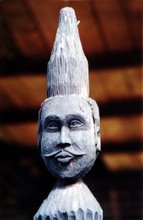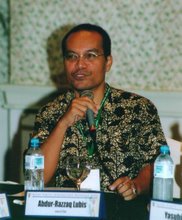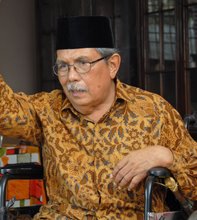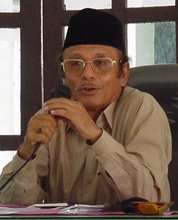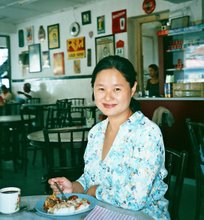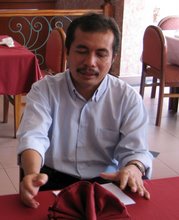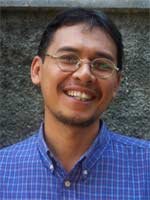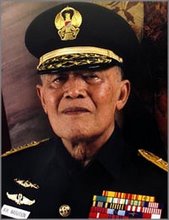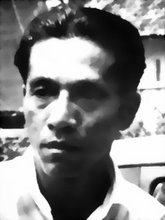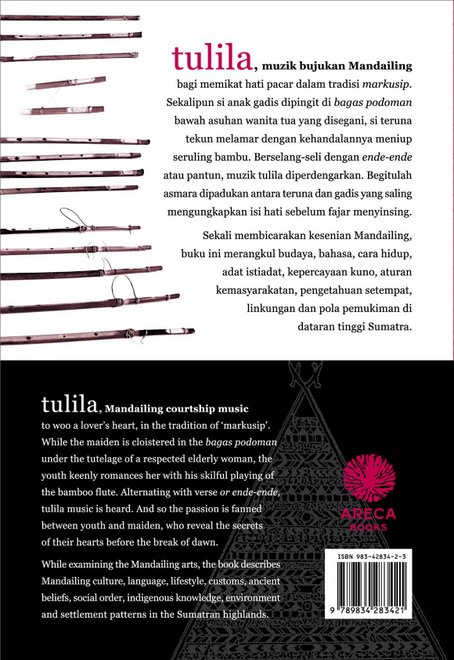
The 1958 Ramon Magsaysay Award for Journalism, Literature and Creative Communication Arts
BIOGRAPHY of Mochtar Lubis
MOCHTAR LUBIS was born on March 7, 1922 in Padang, Central Sumatra. The sixth of 10 children of a Demang, or District Commissioner? the highest rank an Indonesian could hold in the Dutch administration of Sumatra; his elementary education was taken at a Dutch government school in Sungei Penuh, where his father was then posted. The family home atop a small hill in the center of the town was often the gay gathering place of the prominent and talented Sumatran clan to which the father belonged.
Along with the happy recollections of a secure childhood and close family life is the traumatic memory of a particular day when his mother forbade the children to play in the back fruit garden overlooking the district jail at the foot of the hill. While his brothers and sisters dutifully stayed away, the young MOCHTAR's curiosity took him to a perch in a tree with a commanding view of events below. He saw the Dutch Controller, his father, a doctor and other officials standing in the yard of the jail while three prisoners clad in shorts were laid face down on platforms and their outstretched hands and feet secured as three Indonesian jailers with long, black whips approached. The prisoners, he learned afterward, were escapees from a tea estate in Kerintji whom it had been his father's onerous duty to apprehend. In an area of large tea and coffee estates farmed by indentured labor mostly from Java on five year contracts that usually lasted a lifetime, the penalty for seeking escape was 80 lashes. The sight and sounds, as punishment was administered, horrified the small, hidden watcher.
"This made the deepest impression on me," MOCHTAR LUBIS recently wrote, "and even now I can hear their agonized cries. I cannot see injustice, however small, without rebelling in my heart against it." Though he later came to understand that harsh punishment was common practice for indentured labor in many free as well as colonial areas at the time and that Dutch law could also insure security for the individual, this early initiation to oppression made him from his boyhood a champion of humane treatment and fair play.
The father repeatedly advised his sons "never to become a colonial administrative official" like himself. Accordingly, for his higher education MOCHTAR LUBIS was sent to a private business college in Kaju Tanam in Central Sumatra rather than to a government institution where Indonesians then were educated only to become civil servants. The business college, run by the nationalist movement in Sumatra, taught students to think more independently. There he studied economics, political science and languages, graduating, in 1941, with fluency in Dutch, English and German as well as his native tongue.
When World War II reached Indonesia, he was in Djakarta and was quickly taken by the Japanese into a radio monitoring unit where his assignment was to listen to and summarize broadcasts by the British Broadcasting Company, the Voice of America and from Australia and other Allied countries. In the compound were Dutch and other nationals but only Indonesians were allowed to come and go. For the three and one-half years he was engaged in this work, he regularly took information gleaned from Allied broadcasts to his brother, Bachtar, who was in the Indonesian underground resistance.
During the war, he met petite Halema Kartawijaya, who was working on the Japanese daily newspaper, Asia Raya. They were married on July 2, 1945 and have two sons and a daughter.
In 1945, he joined the nationalist Antara News Agency, organized by Adam Malik in the early 1930's and revived after the Japanese surrender. When the Indonesian republican government moved to Jogjakarta in Central Java at the outbreak of the independence revolution, LUBIS was asked to stay behind as head of the Agency's Djakarta Bureau. On December 29, 1949, he founded, with the backing of a group of veterans, the Indonesia Raya, of which he is editor-in-chief and part-owner. From 1952 to 1954, he concurrently edited the English-language Times of Indonesia. He is chairman of the Indonesian National Committee of the International Press Institute (IPI) of which he was a principal organizer in 1954.
In these capacities, Mr. LUBIS has traveled widely, usually on journalistic missions. In 1947, he attended the First Asian Conference in New Delhi, India, organized by Mahatma Gandhi and Jawaharlal Nehru to encourage independence movements in Asia. In 1950, he visited the countries of East and Southeast Asia from Japan to Burma with Adam Malik. In September and October 1952, he served as a war correspondent with the United Nations in Korea. Invited to the United States on a leadership grant in 1953, he returned to Indonesia through Europe and the Middle East. A delegate to the IPI General Assembly in Paris in 1954, he also visited other countries in Europe and Israel. In 1955, professional work took him to Mexico, the United States and Europe and, in 1956, after attending the IPI Asian Regional Conference in Tokyo, he visited several Southeast Asian countries.
Deeply committed from his school days to the nationalist cause, his writings, including several books, short stories and regular editorials, have demonstrated an active interest in national problems. One of his books was critical of the Indonesian diplomatic service. In 1952, he received ad Award from the Indonesian Press Association for his reporting on Korea and, in 1953, won the Indonesian National Literary Award for his novel on the Indonesian revolution, The Endless Road.
By his definition, the "true goals" of the fight for freedom against Dutch colonialism were to achieve democratic rights for the Indonesian people, to guarantee basic human rights to all, to achieve economic justice, prosperity and happiness for the people, and to build traditions of respect for the rule of law in freedom and justice. Seeing the preservation of these goals threatened, he began, in 1953, a crusade against government corruption, violation of civil liberties by the military and against the inroads of totalitarianism, which made Indonesia Raya one of the four most widely read newspapers in the country but incurred the animosity of many leading politicians and high officials in government and the military.
On the evening of August 12, 1956, one of his news sources told him of the pending arrest of Foreign Minister Ruslan Abdulgani by the Commander of the West Java Military Territory, Colonel Kawilarang. The arrest, to be made on the eve of the Foreign Minister's departure for Suez Canal talks in London, was in connection with the so-called Lie Hok Thay affair. Lie, an official in the State Printing Plant who had been kidnapped by unidentified men and later turned over to the police, had confessed to manipulation of several millions of rupiahs from the general election funds. Implicated in Lie's confession were a number of high officials, including the Foreign Minister.Attempted as the tipster had foretold, the arrest was prevented by the Prime Minister and Chief of Staff of the Army, and the Foreign Minister was allowed to leave for London. Arrests were made of a former Information Minister and the manager of the State Printing Plant, both also implicated by Lie, and their cases were brought to court. Indonesia Raya, being a morning paper, missed the story in its regular August 13 edition, so a special bulletin was published in mid-afternoon giving the main points of the thwarted arrest of the Foreign Minister.
A few days later in Parliament, Prime Minister Ali Sastroamidjojo charged that the attempt to arrest the Foreign Minister was part of a plot to overthrow the government. After the Foreign Minister's return from London, a special Cabinet committee was established to investigate the accusations against him, with the Attorney General and a representative of army headquarters invited to attend the sessions. The committee subsequently issued a statement that examination of evidence produced by police who had interrogated Lie Hok Thay yielded no grounds for legal prosecution of the Foreign Minister. The Attorney General later issued a statement in a similar vein.
Indonesia Raya, meanwhile, continued to research the case. On August 30, on the basis of documentary evidence in hand, the paper carried an editorial accusing the Cabinet of political conspiracy to cover machinations by the Foreign Minister. Reportedly under pressure from the Cabinet, the Attorney General promptly started proceedings against LUBIS as responsible editor of the paper on the grounds that he had violated Articles 154 and 207 of the Penal Code by publishing derogatory material about the Foreign Minister. The two Articles were leftovers from the Dutch Penal Code under which a maximum sentence of seven years could be levied against any person found guilty of "harboring and expressing hostile sentiments against the government." Under the republic, as in colonial times, persons indicted under these Articles were often tried summarily; the judge could ignore evidence introduced by defendants to prove the validity of their expressions or writings and could decline the calling of defense witnesses.
When LUBIS was summoned before the civil court in Djakarta in December 1956, he protested against the use of the "colonial" Articles, demanding that he be tried under normal libel laws. This the judge refused along with LUBIS' second demand that he be allowed to call witnesses. To the third demand that he be allowed to produce photostatic copies of documents to prove the truth of his newspaper articles, the judge assented.
Introduced into evidence by LUBIS were photostats of police documents on Lie Hok Thay's confession and that of the manager of the State Printing Plant, wherein he admitted having given large amounts of money to the Foreign Minister from general election funds. A third document was a copy of the report of the Chief of the Criminal Department of the Djakarta Police on his confiscation of a car and house belonging to the Foreign Minister?an action not publicly known until this evidence was introduced in court by LUBIS. Fourth was a photostatic copy of the admission by the former Chief of the Military Police Headquarters of Djakarta that he had received, in the United States, foreign exchange sent to him from Indonesia by Lie Hok Thay, with the Foreign Minister acting as courier on the occasion of President Sukarno's State Visit in May, 1956.
With the exposure of these documents, the police departments concerned publicly admitted they were official and genuine. The judge thereupon acquitted LUBIS of all charges. Subsequent publication of the documents in Indonesia Raya and quotation by most other newspapers in the country forced the Attorney General to review the case and announce that he now had evidence to start legal proceedings against the Foreign Minister, whom the Supreme Court had already decided to bring to trial as was done in March 1957.
Before LUBIS was charged, he had been urged by representatives of the President, the Information Minister and other officials to tone down his crusade. Among other inducements, he was offered a three million rupiah loan not to support but simply not to criticize the Cabinet. Several officials from the Attorney General's office advised him directly that the Attorney General was under heavy pressure to prosecute him under the old penal code.
To a friend who had asked why he kept up the struggle when the possibilities of influencing those in senior positions seemed bleak, LUBIS wrote: "I feel we must never compromise our principles if the goals of our revolution are to be preserved, but we must continue to expose abuses of power and fight as hard as we can against the spread of communist influence. The challenge has to be met by working hard and by working with facts and the truth."Soon after editor LUBIS achieved his victory in court, a nephew, Colonel Zulkifli Lubis, became involved in one of the army's recurrent crises. Though satisfactory evidence was never given to substantiate the charge that he had attempted a coup d'etat, suspicion of the LUBIS clan was heightened in unfriendly official circles. Having published the government's accusation, Indonesia Raya "found it no more than just" to publish several letters written by Col. Lubis from his hiding place explaining his position. Several other newspapers followed suit.On December 21, 1956, the military commander of the army regiment in Central Sumatra proclaimed the taking over of civil administration from the Governor and demanded that a new cabinet be formed and changes made in the military headquarters in Djakarta to eliminate corruption and communist infiltration. Indonesia Raya and two other dailies in Djakarta were the first to break this news in the capital.
On the evening of December 21, MOCHTAR LUBIS was arrested by military police after an unsuccessful attempt to kidnap him by armed civilians, and Indonesia Raya was placed under military censorship. Immediately deleted was an editorial intended for the following day, in which the paper had taken the position the Sumatra problem could not be solved by the Ali Sastroamidjojo Cabinet.Following two days of detention in the military police barracks in Djakarta, LUBIS was interrogated for about 10 minutes to establish only his identity and family relationship to Col. Lubis. He then was moved to the Djakarta Military Prison where, five days later, he was again interrogated by military police, this time as to why he published Col. Lubis' letters and how he happened to be the first to publish news of the Central Sumatra coup. Asked to write the names of his editorial staff and accused of a political affiliation he did not have, he was finally questioned about the editorial which had been suppressed by the military police.
After another two weeks and following protests by the IPI and many groups in Indonesia, LUBIS was released from prison but placed under house arrest "in the interest of peace and security" and forbidden to write for his newspaper, give interviews, or receive phone calls or letters. Up to now, no charges have been formally preferred against him.Since his detention, Mrs. Lubis has gone each day to manage Indonesia Raya. In defiance of his "political" incarceration, LUBIS has continued to write editorials and comments which could readily be recognized as his. The paper has been operating under financial and editorial handicaps resulting from irregular publication; banned for a week, allowed to publish for a month, stopped again while members of the editorial staff are arrested for one or two days and then permitted to resume, it has been under continual harassment by the military.
Lauding his defense of the right of honest dissent, LUBIS was judged the outstanding journalist in Indonesia for 1957 and the Indonesia Raya the best newspaper in an annual nationwide poll conducted by the College of Journalism and Political Science of the University of Indonesia.In May 1958, Indonesia Raya was suspended anew on charges that it had published a report considered by the Greater Djakarta City Command as "not conducive to public security." The report concerned the acquisition of Soviet MIG fighter planes for the Indonesian Air Force. Suspension was lifted in early June, 1958.At the IPI General Assembly in Amsterdam in May 1957, and again at an Asian Regional Conference in Ceylon last December, resolutions were adopted protesting the detention of LUBIS. In the March 1958 IPI Report of this Geneva-based world-wide organization of editors devoted to promotion of press freedom, the following remarks appear:
A SAD ANNIVERSARY
More than fourteen months have passed since military police in Djakarta arrested and imprisoned Indonesia Raya editor Mochtar Lubis in December 1956. Chairman of the Indonesian IPI National Committee, editor Lubis has long been an outspoken critic of certain aspects of government and army affairs.For the past year IPI Report has featured in a prominent position?usually on the back page?a black-bordered box calling attention to this journalist's plight. In reply to protests and demands from IPI and others that Lubis' rights be respected, the government released him from prison, placed him under house arrest and declared that he was not being held in connection with his work as a journalist. Yet, as we go to press with our twelfth monthly reminder that Lubis is still under arrest and that no charges have been preferred against him, there is no indication that his internment is near an end. It is a sad commentary for press freedom in Indonesia.
The Editor" August 1958 Manila REFERENCES:Asia Who's Who, Hong Kong, Pan Asia Newspaper Alliance, 1957. Atlantic Monthly, June 1956. IPI Report, March, 1958. International Who's Who, London, Europa Publications, Ltd., 1957. Philippines Free Press, Manila, April 5, 1958. Letters from and interviews with journalists and other observers acquainted with Mochtar Lubis.
EPILOGUE Indonesia Raya was suppressed in September 1958. Learning that the government intended to close down all opposition papers, MOCHTAR LUBIS arranged through friends, in 1959, to sell the printing plant and to repay the balance of the bank loan by which it had been purchased.
Editor LUBIS was kept under house arrest from January 1957 until May 1961. Upon his release he was invited to attend the IPI General Assembly in Tel Aviv. Enroute, he visited his colleagues in Malaya, Thailand and India and extended his trip to Europe after the Assembly. A press report of his speech at Tel Aviv carried in Djakarta papers quoted him as being critical of the Indonesian government. Actually talking in more general terms, he had said some leaders in Asia and Africa were maintaining that, for the sake of establishing freedom from hunger, freedom of expression could be sacrificed. LUBIS disagreed with this proposition: ". . . To me both freedoms are indivisible, and one cannot have meaning without the other because men are not cattle."Arrested again upon his return in July 1961, he was imprisoned without trial under martial law. The Djakarta Military Prison, where he was held for more than six months, was unclean, food was extremely poor, and medical care minimal, but prisoners were allowed to receive extra food twice a week from their homes and to buy their own medicines.
In January 1962, he was moved with other political detainees to Madiun Prison in East Java and was kept there for the next three years and nine months. Conditions were much better than in Djakarta, though additional food still had to be obtained from outside and both doctors and medicines had to be paid for. A source of great comfort were the monthly visits by his wife and children, when they could leave their schools. He read extensively books his wife brought and other prisoners received. One was an introduction to yoga, leading him to practice and teach some of his fellow prisoners this physical and emotional discipline. Accustomed to active sports, he played tennis inside and outside the prison when allowed. He painted, wrote and joined with others to make mosaics and ceramics. The prisoners held music classes and he had many philosophical discussions with such distinguished fellow inmates as Dr. Anuk Agung of Bali, former Foreign Minister, Interior Minister and Ambassador to Belgium and France; Dr. Rum also a former Foreign Minister and a Masjumi leader; Prawato Mangkusasmito, an ex-Vice Premier and Masjumi leader; and Subadio Sastrosatomo, parliamentary leader of the Socialist Party.
Appeals by Asian and Western intellectuals and the IPI to have him released or at least brought to trial were repeatedly ignored.From Madiun, LUBIS wrote a reflective letter to an IPI associate as he was approaching the tenth year of house arrest and imprisonment. Referring to the lashing of the three contract coolies in this childhood, which first taught him to rebel against injustice, he added:". . . To me a man, however humble and poor, is entitled to his rights as Man; he is an entity to be respected as Man. I consciously pursue the ideal of all men being of one family, regardless of their color, race or religion; I am fully convinced that mankind can only survive when nations grow into an integrated family of nations."
To me a good nationalist in our world of today must be also, first of all, a good internationalist; that is, he must weigh the welfare of other peoples as heavily as he weighs the welfare of his own."Every nation has something of value to contribute for the common good of the world, be it in the form of some of its own traditional or cultural values, wealth of natural resources, or technical and scientific knowledge. Hence no nation needs to feel inferior, and no man needs to suffer from any inferiority complex, because Man contains within himself the capacity to reach for progress and goodness and nobility . . ."Public leaders must not only lead a healthy public life, but a healthy private life as well . . ."A writer's work is only as true as his heart is true . . .
"Following the attempted Communist takeover of government in September 1965, averted by elements of the army under General Suharto, LUBIS and a number of other intellectuals and political leaders were transferred to the Djakarta Military Prison. He was then no longer being held under martial law but under Presidential Decree No. 3, issued in December 1962, which empowers the Attorney General, by authority of the President, to enforce "any place of living at his discretion for any person suspected of obstructing achievement of the purposes of the revolution.
"After three months, from October until the end of December 1965, he was transferred to a well-guarded private home in downtown Djakarta where with several other prisoners he lived more comfortably. On May 15, he was released to his home but remained under city arrest. By this time, documentary evidence had been found by the new government that LUBIS had been among those marked for execution had the Communists achieved control.Invited by the Ramon Magsaysay Award Foundation to attend the Award ceremonies in Manila on August 31, 1966, to receive the medal and citation held for him in safekeeping since August 1958, he was given permission to leave Djakarta for this purpose by Foreign Minister Adam Malik. Attorney General Sugih Arto, however, countermanded the Foreign Minister's permit on the grounds that LUBIS was still under city arrest and no other detainees under similar restraint had been allowed to leave.
In September 1966, Mochtar Lubis was given full freedom. He received his medal and citation from the Board of Trustees of the Foundation in Manila on October 31, 1966. On that occasion he simply but eloquently expressed the value to him during his long time of trial of such acknowledgements as the Foundation's of his "crusade for truth and justice."
November l, 1966 Manila
http://www.rmaf.org.ph/Awardees/Biography/BiographyLubisMoc.htm
BIOGRAPHY of Mochtar Lubis
MOCHTAR LUBIS was born on March 7, 1922 in Padang, Central Sumatra. The sixth of 10 children of a Demang, or District Commissioner? the highest rank an Indonesian could hold in the Dutch administration of Sumatra; his elementary education was taken at a Dutch government school in Sungei Penuh, where his father was then posted. The family home atop a small hill in the center of the town was often the gay gathering place of the prominent and talented Sumatran clan to which the father belonged.
Along with the happy recollections of a secure childhood and close family life is the traumatic memory of a particular day when his mother forbade the children to play in the back fruit garden overlooking the district jail at the foot of the hill. While his brothers and sisters dutifully stayed away, the young MOCHTAR's curiosity took him to a perch in a tree with a commanding view of events below. He saw the Dutch Controller, his father, a doctor and other officials standing in the yard of the jail while three prisoners clad in shorts were laid face down on platforms and their outstretched hands and feet secured as three Indonesian jailers with long, black whips approached. The prisoners, he learned afterward, were escapees from a tea estate in Kerintji whom it had been his father's onerous duty to apprehend. In an area of large tea and coffee estates farmed by indentured labor mostly from Java on five year contracts that usually lasted a lifetime, the penalty for seeking escape was 80 lashes. The sight and sounds, as punishment was administered, horrified the small, hidden watcher.
"This made the deepest impression on me," MOCHTAR LUBIS recently wrote, "and even now I can hear their agonized cries. I cannot see injustice, however small, without rebelling in my heart against it." Though he later came to understand that harsh punishment was common practice for indentured labor in many free as well as colonial areas at the time and that Dutch law could also insure security for the individual, this early initiation to oppression made him from his boyhood a champion of humane treatment and fair play.
The father repeatedly advised his sons "never to become a colonial administrative official" like himself. Accordingly, for his higher education MOCHTAR LUBIS was sent to a private business college in Kaju Tanam in Central Sumatra rather than to a government institution where Indonesians then were educated only to become civil servants. The business college, run by the nationalist movement in Sumatra, taught students to think more independently. There he studied economics, political science and languages, graduating, in 1941, with fluency in Dutch, English and German as well as his native tongue.
When World War II reached Indonesia, he was in Djakarta and was quickly taken by the Japanese into a radio monitoring unit where his assignment was to listen to and summarize broadcasts by the British Broadcasting Company, the Voice of America and from Australia and other Allied countries. In the compound were Dutch and other nationals but only Indonesians were allowed to come and go. For the three and one-half years he was engaged in this work, he regularly took information gleaned from Allied broadcasts to his brother, Bachtar, who was in the Indonesian underground resistance.
During the war, he met petite Halema Kartawijaya, who was working on the Japanese daily newspaper, Asia Raya. They were married on July 2, 1945 and have two sons and a daughter.
In 1945, he joined the nationalist Antara News Agency, organized by Adam Malik in the early 1930's and revived after the Japanese surrender. When the Indonesian republican government moved to Jogjakarta in Central Java at the outbreak of the independence revolution, LUBIS was asked to stay behind as head of the Agency's Djakarta Bureau. On December 29, 1949, he founded, with the backing of a group of veterans, the Indonesia Raya, of which he is editor-in-chief and part-owner. From 1952 to 1954, he concurrently edited the English-language Times of Indonesia. He is chairman of the Indonesian National Committee of the International Press Institute (IPI) of which he was a principal organizer in 1954.
In these capacities, Mr. LUBIS has traveled widely, usually on journalistic missions. In 1947, he attended the First Asian Conference in New Delhi, India, organized by Mahatma Gandhi and Jawaharlal Nehru to encourage independence movements in Asia. In 1950, he visited the countries of East and Southeast Asia from Japan to Burma with Adam Malik. In September and October 1952, he served as a war correspondent with the United Nations in Korea. Invited to the United States on a leadership grant in 1953, he returned to Indonesia through Europe and the Middle East. A delegate to the IPI General Assembly in Paris in 1954, he also visited other countries in Europe and Israel. In 1955, professional work took him to Mexico, the United States and Europe and, in 1956, after attending the IPI Asian Regional Conference in Tokyo, he visited several Southeast Asian countries.
Deeply committed from his school days to the nationalist cause, his writings, including several books, short stories and regular editorials, have demonstrated an active interest in national problems. One of his books was critical of the Indonesian diplomatic service. In 1952, he received ad Award from the Indonesian Press Association for his reporting on Korea and, in 1953, won the Indonesian National Literary Award for his novel on the Indonesian revolution, The Endless Road.
By his definition, the "true goals" of the fight for freedom against Dutch colonialism were to achieve democratic rights for the Indonesian people, to guarantee basic human rights to all, to achieve economic justice, prosperity and happiness for the people, and to build traditions of respect for the rule of law in freedom and justice. Seeing the preservation of these goals threatened, he began, in 1953, a crusade against government corruption, violation of civil liberties by the military and against the inroads of totalitarianism, which made Indonesia Raya one of the four most widely read newspapers in the country but incurred the animosity of many leading politicians and high officials in government and the military.
On the evening of August 12, 1956, one of his news sources told him of the pending arrest of Foreign Minister Ruslan Abdulgani by the Commander of the West Java Military Territory, Colonel Kawilarang. The arrest, to be made on the eve of the Foreign Minister's departure for Suez Canal talks in London, was in connection with the so-called Lie Hok Thay affair. Lie, an official in the State Printing Plant who had been kidnapped by unidentified men and later turned over to the police, had confessed to manipulation of several millions of rupiahs from the general election funds. Implicated in Lie's confession were a number of high officials, including the Foreign Minister.Attempted as the tipster had foretold, the arrest was prevented by the Prime Minister and Chief of Staff of the Army, and the Foreign Minister was allowed to leave for London. Arrests were made of a former Information Minister and the manager of the State Printing Plant, both also implicated by Lie, and their cases were brought to court. Indonesia Raya, being a morning paper, missed the story in its regular August 13 edition, so a special bulletin was published in mid-afternoon giving the main points of the thwarted arrest of the Foreign Minister.
A few days later in Parliament, Prime Minister Ali Sastroamidjojo charged that the attempt to arrest the Foreign Minister was part of a plot to overthrow the government. After the Foreign Minister's return from London, a special Cabinet committee was established to investigate the accusations against him, with the Attorney General and a representative of army headquarters invited to attend the sessions. The committee subsequently issued a statement that examination of evidence produced by police who had interrogated Lie Hok Thay yielded no grounds for legal prosecution of the Foreign Minister. The Attorney General later issued a statement in a similar vein.
Indonesia Raya, meanwhile, continued to research the case. On August 30, on the basis of documentary evidence in hand, the paper carried an editorial accusing the Cabinet of political conspiracy to cover machinations by the Foreign Minister. Reportedly under pressure from the Cabinet, the Attorney General promptly started proceedings against LUBIS as responsible editor of the paper on the grounds that he had violated Articles 154 and 207 of the Penal Code by publishing derogatory material about the Foreign Minister. The two Articles were leftovers from the Dutch Penal Code under which a maximum sentence of seven years could be levied against any person found guilty of "harboring and expressing hostile sentiments against the government." Under the republic, as in colonial times, persons indicted under these Articles were often tried summarily; the judge could ignore evidence introduced by defendants to prove the validity of their expressions or writings and could decline the calling of defense witnesses.
When LUBIS was summoned before the civil court in Djakarta in December 1956, he protested against the use of the "colonial" Articles, demanding that he be tried under normal libel laws. This the judge refused along with LUBIS' second demand that he be allowed to call witnesses. To the third demand that he be allowed to produce photostatic copies of documents to prove the truth of his newspaper articles, the judge assented.
Introduced into evidence by LUBIS were photostats of police documents on Lie Hok Thay's confession and that of the manager of the State Printing Plant, wherein he admitted having given large amounts of money to the Foreign Minister from general election funds. A third document was a copy of the report of the Chief of the Criminal Department of the Djakarta Police on his confiscation of a car and house belonging to the Foreign Minister?an action not publicly known until this evidence was introduced in court by LUBIS. Fourth was a photostatic copy of the admission by the former Chief of the Military Police Headquarters of Djakarta that he had received, in the United States, foreign exchange sent to him from Indonesia by Lie Hok Thay, with the Foreign Minister acting as courier on the occasion of President Sukarno's State Visit in May, 1956.
With the exposure of these documents, the police departments concerned publicly admitted they were official and genuine. The judge thereupon acquitted LUBIS of all charges. Subsequent publication of the documents in Indonesia Raya and quotation by most other newspapers in the country forced the Attorney General to review the case and announce that he now had evidence to start legal proceedings against the Foreign Minister, whom the Supreme Court had already decided to bring to trial as was done in March 1957.
Before LUBIS was charged, he had been urged by representatives of the President, the Information Minister and other officials to tone down his crusade. Among other inducements, he was offered a three million rupiah loan not to support but simply not to criticize the Cabinet. Several officials from the Attorney General's office advised him directly that the Attorney General was under heavy pressure to prosecute him under the old penal code.
To a friend who had asked why he kept up the struggle when the possibilities of influencing those in senior positions seemed bleak, LUBIS wrote: "I feel we must never compromise our principles if the goals of our revolution are to be preserved, but we must continue to expose abuses of power and fight as hard as we can against the spread of communist influence. The challenge has to be met by working hard and by working with facts and the truth."Soon after editor LUBIS achieved his victory in court, a nephew, Colonel Zulkifli Lubis, became involved in one of the army's recurrent crises. Though satisfactory evidence was never given to substantiate the charge that he had attempted a coup d'etat, suspicion of the LUBIS clan was heightened in unfriendly official circles. Having published the government's accusation, Indonesia Raya "found it no more than just" to publish several letters written by Col. Lubis from his hiding place explaining his position. Several other newspapers followed suit.On December 21, 1956, the military commander of the army regiment in Central Sumatra proclaimed the taking over of civil administration from the Governor and demanded that a new cabinet be formed and changes made in the military headquarters in Djakarta to eliminate corruption and communist infiltration. Indonesia Raya and two other dailies in Djakarta were the first to break this news in the capital.
On the evening of December 21, MOCHTAR LUBIS was arrested by military police after an unsuccessful attempt to kidnap him by armed civilians, and Indonesia Raya was placed under military censorship. Immediately deleted was an editorial intended for the following day, in which the paper had taken the position the Sumatra problem could not be solved by the Ali Sastroamidjojo Cabinet.Following two days of detention in the military police barracks in Djakarta, LUBIS was interrogated for about 10 minutes to establish only his identity and family relationship to Col. Lubis. He then was moved to the Djakarta Military Prison where, five days later, he was again interrogated by military police, this time as to why he published Col. Lubis' letters and how he happened to be the first to publish news of the Central Sumatra coup. Asked to write the names of his editorial staff and accused of a political affiliation he did not have, he was finally questioned about the editorial which had been suppressed by the military police.
After another two weeks and following protests by the IPI and many groups in Indonesia, LUBIS was released from prison but placed under house arrest "in the interest of peace and security" and forbidden to write for his newspaper, give interviews, or receive phone calls or letters. Up to now, no charges have been formally preferred against him.Since his detention, Mrs. Lubis has gone each day to manage Indonesia Raya. In defiance of his "political" incarceration, LUBIS has continued to write editorials and comments which could readily be recognized as his. The paper has been operating under financial and editorial handicaps resulting from irregular publication; banned for a week, allowed to publish for a month, stopped again while members of the editorial staff are arrested for one or two days and then permitted to resume, it has been under continual harassment by the military.
Lauding his defense of the right of honest dissent, LUBIS was judged the outstanding journalist in Indonesia for 1957 and the Indonesia Raya the best newspaper in an annual nationwide poll conducted by the College of Journalism and Political Science of the University of Indonesia.In May 1958, Indonesia Raya was suspended anew on charges that it had published a report considered by the Greater Djakarta City Command as "not conducive to public security." The report concerned the acquisition of Soviet MIG fighter planes for the Indonesian Air Force. Suspension was lifted in early June, 1958.At the IPI General Assembly in Amsterdam in May 1957, and again at an Asian Regional Conference in Ceylon last December, resolutions were adopted protesting the detention of LUBIS. In the March 1958 IPI Report of this Geneva-based world-wide organization of editors devoted to promotion of press freedom, the following remarks appear:
A SAD ANNIVERSARY
More than fourteen months have passed since military police in Djakarta arrested and imprisoned Indonesia Raya editor Mochtar Lubis in December 1956. Chairman of the Indonesian IPI National Committee, editor Lubis has long been an outspoken critic of certain aspects of government and army affairs.For the past year IPI Report has featured in a prominent position?usually on the back page?a black-bordered box calling attention to this journalist's plight. In reply to protests and demands from IPI and others that Lubis' rights be respected, the government released him from prison, placed him under house arrest and declared that he was not being held in connection with his work as a journalist. Yet, as we go to press with our twelfth monthly reminder that Lubis is still under arrest and that no charges have been preferred against him, there is no indication that his internment is near an end. It is a sad commentary for press freedom in Indonesia.
The Editor" August 1958 Manila REFERENCES:Asia Who's Who, Hong Kong, Pan Asia Newspaper Alliance, 1957. Atlantic Monthly, June 1956. IPI Report, March, 1958. International Who's Who, London, Europa Publications, Ltd., 1957. Philippines Free Press, Manila, April 5, 1958. Letters from and interviews with journalists and other observers acquainted with Mochtar Lubis.
EPILOGUE Indonesia Raya was suppressed in September 1958. Learning that the government intended to close down all opposition papers, MOCHTAR LUBIS arranged through friends, in 1959, to sell the printing plant and to repay the balance of the bank loan by which it had been purchased.
Editor LUBIS was kept under house arrest from January 1957 until May 1961. Upon his release he was invited to attend the IPI General Assembly in Tel Aviv. Enroute, he visited his colleagues in Malaya, Thailand and India and extended his trip to Europe after the Assembly. A press report of his speech at Tel Aviv carried in Djakarta papers quoted him as being critical of the Indonesian government. Actually talking in more general terms, he had said some leaders in Asia and Africa were maintaining that, for the sake of establishing freedom from hunger, freedom of expression could be sacrificed. LUBIS disagreed with this proposition: ". . . To me both freedoms are indivisible, and one cannot have meaning without the other because men are not cattle."Arrested again upon his return in July 1961, he was imprisoned without trial under martial law. The Djakarta Military Prison, where he was held for more than six months, was unclean, food was extremely poor, and medical care minimal, but prisoners were allowed to receive extra food twice a week from their homes and to buy their own medicines.
In January 1962, he was moved with other political detainees to Madiun Prison in East Java and was kept there for the next three years and nine months. Conditions were much better than in Djakarta, though additional food still had to be obtained from outside and both doctors and medicines had to be paid for. A source of great comfort were the monthly visits by his wife and children, when they could leave their schools. He read extensively books his wife brought and other prisoners received. One was an introduction to yoga, leading him to practice and teach some of his fellow prisoners this physical and emotional discipline. Accustomed to active sports, he played tennis inside and outside the prison when allowed. He painted, wrote and joined with others to make mosaics and ceramics. The prisoners held music classes and he had many philosophical discussions with such distinguished fellow inmates as Dr. Anuk Agung of Bali, former Foreign Minister, Interior Minister and Ambassador to Belgium and France; Dr. Rum also a former Foreign Minister and a Masjumi leader; Prawato Mangkusasmito, an ex-Vice Premier and Masjumi leader; and Subadio Sastrosatomo, parliamentary leader of the Socialist Party.
Appeals by Asian and Western intellectuals and the IPI to have him released or at least brought to trial were repeatedly ignored.From Madiun, LUBIS wrote a reflective letter to an IPI associate as he was approaching the tenth year of house arrest and imprisonment. Referring to the lashing of the three contract coolies in this childhood, which first taught him to rebel against injustice, he added:". . . To me a man, however humble and poor, is entitled to his rights as Man; he is an entity to be respected as Man. I consciously pursue the ideal of all men being of one family, regardless of their color, race or religion; I am fully convinced that mankind can only survive when nations grow into an integrated family of nations."
To me a good nationalist in our world of today must be also, first of all, a good internationalist; that is, he must weigh the welfare of other peoples as heavily as he weighs the welfare of his own."Every nation has something of value to contribute for the common good of the world, be it in the form of some of its own traditional or cultural values, wealth of natural resources, or technical and scientific knowledge. Hence no nation needs to feel inferior, and no man needs to suffer from any inferiority complex, because Man contains within himself the capacity to reach for progress and goodness and nobility . . ."Public leaders must not only lead a healthy public life, but a healthy private life as well . . ."A writer's work is only as true as his heart is true . . .
"Following the attempted Communist takeover of government in September 1965, averted by elements of the army under General Suharto, LUBIS and a number of other intellectuals and political leaders were transferred to the Djakarta Military Prison. He was then no longer being held under martial law but under Presidential Decree No. 3, issued in December 1962, which empowers the Attorney General, by authority of the President, to enforce "any place of living at his discretion for any person suspected of obstructing achievement of the purposes of the revolution.
"After three months, from October until the end of December 1965, he was transferred to a well-guarded private home in downtown Djakarta where with several other prisoners he lived more comfortably. On May 15, he was released to his home but remained under city arrest. By this time, documentary evidence had been found by the new government that LUBIS had been among those marked for execution had the Communists achieved control.Invited by the Ramon Magsaysay Award Foundation to attend the Award ceremonies in Manila on August 31, 1966, to receive the medal and citation held for him in safekeeping since August 1958, he was given permission to leave Djakarta for this purpose by Foreign Minister Adam Malik. Attorney General Sugih Arto, however, countermanded the Foreign Minister's permit on the grounds that LUBIS was still under city arrest and no other detainees under similar restraint had been allowed to leave.
In September 1966, Mochtar Lubis was given full freedom. He received his medal and citation from the Board of Trustees of the Foundation in Manila on October 31, 1966. On that occasion he simply but eloquently expressed the value to him during his long time of trial of such acknowledgements as the Foundation's of his "crusade for truth and justice."
November l, 1966 Manila
http://www.rmaf.org.ph/Awardees/Biography/BiographyLubisMoc.htm
